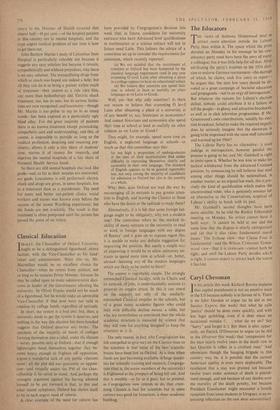Classical Education
IDEALLY, the Chancellor of Oxford University ought to be a distinguished figurehead, above faction; with the Vice-Chancellor as his fund.- raiser and administrator. Were this so, Mr. Macmillan would be an excellent choice for Chancellor—when he retires from politics; not so long as he remains Prime Minister, because he may be called upon to make administrative deci- sions as leader of the Government affecting the university. Sir Oliver Franks would not be much of a figurehead, but he would make an admirable Vice-Chancellor if that post were not held in rotation by college heads, regardless of aptitude.
In short, the system is a bad one; but, then, a university tends to get the system it deserves, and nothing in the way this election has been handled suggests that Oxford deserves any better. The spectacle of the majority Of heads of colleges forming theinselves into a Cabal, under the illusion —surely possible only at Oxford—that if enough lightweights band themselves together they be- come heavy enough to frighten off opposition, argues a wonderful lack of any public relations sense : all the plot did was guarantee an opposi- tion—and virtually assure the PM of the chan- cellorship if he cared to stand. And perhaps the strongest argument against his having allowed himself to *be put forward is that, in this and other recent symptoms, Oxford has shown itself to be in such urgent need of reform.
A clear exaMple'of the need for reform has been provided by Congregation's decision this week that, in future, candidates for university entrance who have Advanced level qualifications in mathematics or a science subject will not in future need Latin. This follows the advice of a committee set up to consider the requirements for admission, which recently reported: (a) We are satisfied that the recruitment of scientists at Oxford has been hampered by the classical language requirement (and in any case cramming 0 level Latin after obtaining a place in a college appears to have no educational value).
(b) We believe that scientists can spend their time at school at least as usefully on other languages as on Latin or Greek.
Well, yes—but why only scientists? Is there any reason to believe that cramming 0 level Latin after obtaining a place at a university is of any benefit to, say, historians or economists? And cannot historians and economists also spend their time at school at least as usefully on othzr subjects as on Latin or Greek?
They might, for example, spend more time on English, a neglected language at schools—so much so that this committee says that far too high a proportion of undergraduates at the time of their matriculation find undue difficulty in expressing themselves clearly and accurately in their own language. The standard of English appears to be in general regrettably low, not only among the majority of candidates for admission to Oxford but also in the country as a whole.
Why, then, does Oxford not lead the way by encouraging all its entrants to pay greater atten- tion to English, and leaving the Classics to those who have the desire or the aptitude to study them?
Alternatively, if it is felt that some foreign lan- guage ought to be obligatory, why not a modern one? The committee refers to 'the, marked in- ability of many entrants to the university to read or work in foreign languages with any degree of fluency' and it goes on to express regret that it is unable to make any definite suggestion for improving the position. But stkrely a simple wai of improving it would be to allow university en- trants to spend more time at school—or, better, abroad--learning any of the modern languages which are likely _to be useful to them?
The answer is regrettably simple. The strongly entrenched Classical faculty, with its Chairs and its network of-jobs, is understandably anxious to preserve its empire intact. In this it can count on the support, not only of the similarly- entrenched Classical empires in the schools, but of a great many academic figures who could only with difficulty decline mensa, a table, but who are nevertheless so convinced that the whole academic structure -is menaced by science that they will vote for anything designed to keep the structure as it is.
The only reason, in fact, why Congilegation has felt compelled to give wayon the (lassies issue to the scientists is that some of the best' scientific brains have been lost to Oxford. At a time when funds are just becoming available in large quanti- ties for scientific training and research, Congrega- tion (that is, the senior members of the university) is frightened at the prospect of being left out. And this is sensible—so far as it goes; but to pretend, as Congregation now intends to do, that cram- ming Classics, is had for scientists but in some curious way good for historians, is sheer academic 'hunribUg.'


































 Previous page
Previous page